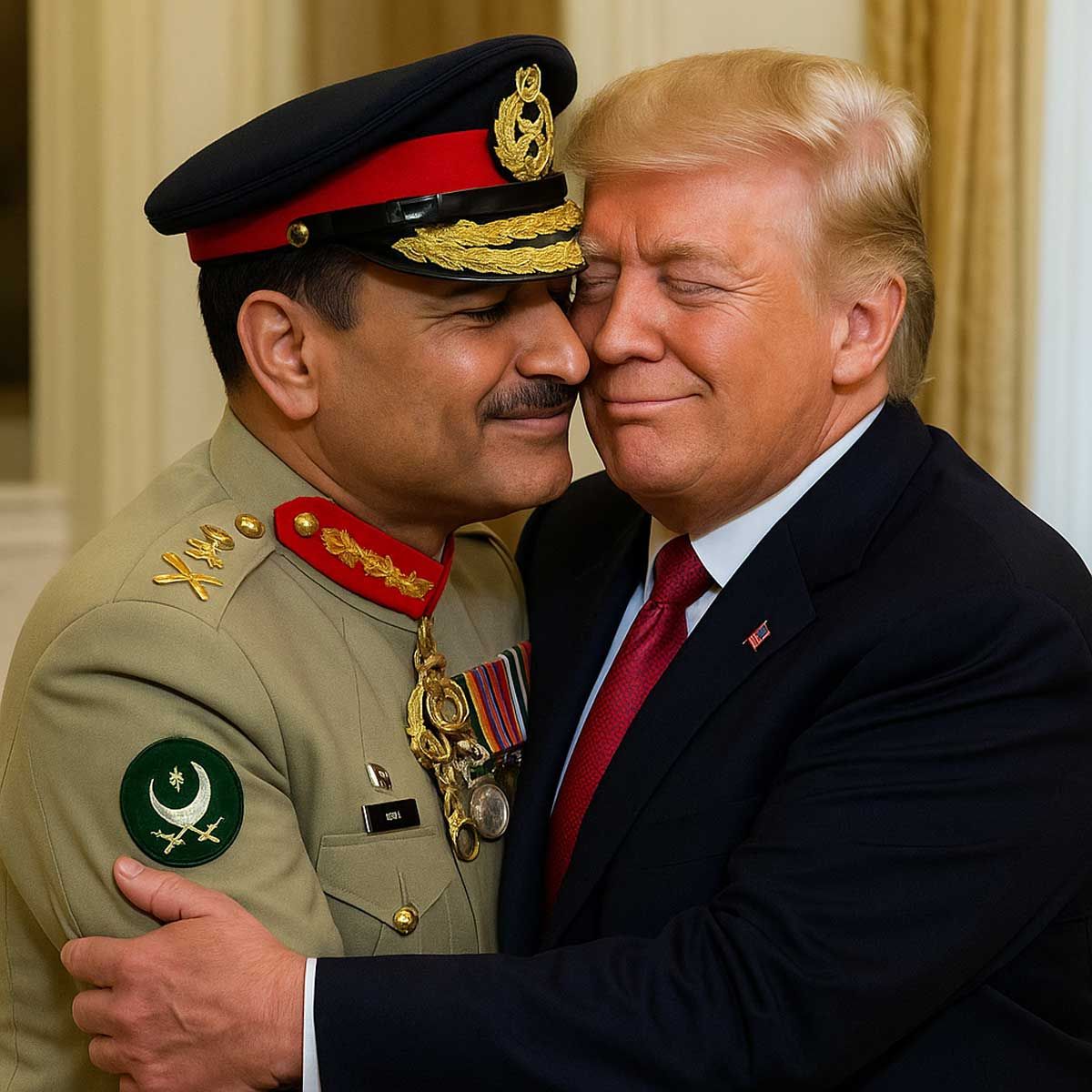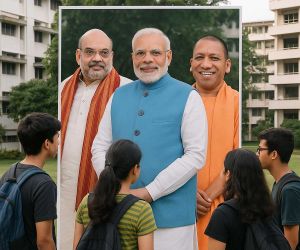MORE COVERAGE
Twitter Coverage
Satyaagrah
Written on
Satyaagrah
Written on
Satyaagrah
Written on
Satyaagrah
Written on
Satyaagrah
Written on
JOIN SATYAAGRAH SOCIAL MEDIA
After elevating a former ISIS leader in Syria and paving the way for Afghanistan’s fall to the Taliban, Trump cements ties with the region’s most notorious Islamic terrorists — Pakistan’s military — in a move blending power, risk, and geopolitical gamble

In geopolitics, relationships are never fixed. Nations have no eternal friends or enemies—only permanent self-interest. This idea is once again on display through the actions of US President Donald Trump. From the war-torn streets of Syria to the tense borders of Pakistan, Trump has shown that self-interest can outweigh principles, even if it means working with some of the most notorious Islamic jihadist figures and their backers.
|
In May 2025, Trump met Ahmed Hussain al-Sharaa, the interim president of Syria. This meeting was remarkable because only a few months earlier, al-Sharaa had a $10 million bounty placed on his head by the US government. He is a former terrorist who openly admitted to celebrating the 9/11 attacks that killed thousands of Americans. Yet, during their meeting, Trump spoke warmly about him. When asked what he thought of the Syrian leader, Trump replied: “Young, attractive guy. Tough guy. Strong past. Very strong past. Fighter.”
While many remember the chaotic withdrawal of US troops from Afghanistan in 2021 under former President Joe Biden, it was Trump’s 2020 Doha Agreement that paved the way for that exit. The deal allowed for the eventual, unprecedented scenes of American forces leaving in a hurry and effectively delivering the country into the hands of Taliban terrorists.
The US had spent 20 years, invested over $2 trillion, and lost hundreds of soldiers fighting the Taliban. Yet, in 2021, they left after signing an agreement with them—handing over military equipment worth billions to the same group they had fought for two decades. Now, Trump has expressed interest in re-establishing a US military presence in Afghanistan, though whether that will succeed remains unclear.
After helping a former ISIS member take charge in Syria and leaving Afghanistan to the Taliban, Trump has now announced “friendship” with the Pakistan Army—often described as the region’s most dangerous Islamic terrorist organisation. This new show of camaraderie came just a month after India’s Operation Sindoor, in which Pakistan suffered a humiliating defeat following its involvement in the Pahalgam Islamic terror attack. Nevertheless, Pakistan’s Field Marshal Asim Munir was hosted by Trump for lunch at the White House.
Though the meeting took place soon after the Indo-Pak clashes, the main discussion reportedly revolved around the Iran-Israel conflict rather than India.
The United States has a long history of using Pakistan to achieve its regional objectives, something even Pakistan’s own leaders have acknowledged. From serving as a base for American operations in Afghanistan to acting as a political intermediary in South Asia, Pakistan has often been a tool for US strategic goals.
Munir’s visit to the US was not just symbolic. He attended the farewell ceremony for the outgoing Commander of the United States Central Command (Centcom). Many believe Trump’s public support has emboldened Munir—or perhaps encouraged him—to make aggressive remarks against India, including nuclear threats and threats to destroy critical infrastructure.
On 10th August, during a private dinner in Tampa, Florida, Munir—described as a madrasa-educated jihadi in uniform who controls Pakistan’s foreign and security policy—made an analogy comparing Pakistan to a dangerous road hazard. He said: “India is shining Mercedes coming on a highway like Ferrari [sic], but we are a dump truck full of gravel. If the truck hits the car, who is going to be the loser?”
He then declared that if India built a dam on the Indus River, Pakistan would destroy it with 10 missiles. In an even more personal attack, he threatened Indian billionaire Mukesh Ambani by citing Islamic scripture. “Ek tweet karwaya tha with Surah Fil and a picture of [industrialist] Mukesh Ambani to show them what we will do the next time,” Munir bragged.
The timing of these statements was striking. The nuclear threat was issued from US soil, appealing to extremist elements in Pakistan while also serving as open nuclear blackmail. Munir went further, saying Pakistan would ‘take half the world down with it’, echoing the mindset of a suicide bomber. It is no coincidence that this statement came exactly 80 years after the US dropped the atomic bomb on Nagasaki.
India responded firmly, rejecting Munir’s threats and making it clear that New Delhi would never give in to such blackmail. However, the US government and much of the mainstream media remained silent, leading to speculation that Washington might be deliberately allowing, or even encouraging, these remarks.
Munir also repeated his earlier statement that “Kashmir is our jugular vein”—a claim he had made just days before the Pahalgam attack. He insisted, “Kashmir is not an internal matter of India but an incomplete international agenda. As the Quaid-e-Azam had said, Kashmir is the ‘jugular vein’ of Pakistan.”
In return for his praise of Trump’s supposed role in ending the Indo-Pak conflict, Munir received a policy win. The Trump administration designated the Balochistan Liberation Army (BLA) and its Majeed Brigade as a Foreign Terrorist Organisation (FTO). This decision strengthened Pakistan’s narrative that Baloch independence fighters are “terrorists,” putting them in the same category as Pakistan-backed jihadist outfits such as Lashkar-e-Taiba, Jaish-e-Mohammad, and The Resistance Front (TRF)—the group responsible for the Pahalgam attack, which had already been designated a terrorist organisation by the US.
On 11th August, the US State Department formally added the Majeed Brigade as an alias to the BLA’s existing Specially Designated Global Terrorist (SDGT) listing, reinforcing Pakistan’s position and raising concerns over the suppression of nationalist movements in Balochistan.
|
Baloch Rebels Resist Pakistan’s Resource Exploitation and Chinese-Backed Projects
For years, the Balochistan Liberation Army (BLA) has targeted both Pakistani military forces and Chinese personnel, along with infrastructure linked to Beijing’s massive investments in the province. The attacks have largely focused on projects tied to the China-Pakistan Economic Corridor (CPEC), which the Baloch see as another means of exploiting their homeland.
The grievances of the Baloch people run deep. They form one of the most marginalised communities in Pakistan, yet their land is rich in natural resources. According to them, both the Pakistani government and China have been exploiting these resources—extracting wealth from Balochistan’s soil—while offering little to no benefit to the local population. For many, this has been an enduring pattern of economic and political neglect.
Recently, US President Donald Trump added a new chapter to this story. He announced a new trade agreement with Islamabad to jointly explore and develop Pakistan’s so-called “massive oil reserves.” What made the timing more controversial was that this announcement came just hours after Trump imposed a 25% tariff and other penalties on Indian imports. In a remark that immediately caught global attention, he suggested that the oil reserves could even become an export to India in the future.
In a post on his Truth Social platform, Trump wrote: “We have just concluded a Deal with the Country of Pakistan, whereby Pakistan and the United States will work together on developing their massive Oil Reserves… Who knows, maybe they’ll be selling Oil to India some day!”
This statement sparked a wave of political discussion, particularly because the majority of Pakistan’s existing oil, much of its gas, and a large share of its prospective reserves are located in Balochistan. Given the province’s long-standing political unrest and the ongoing resistance to exploitation, Trump’s deal raised questions about how Washington might position itself in this resource-rich but unstable region—already heavily influenced by Pakistan’s military and Chinese investment interests.
The situation is further complicated by Trump’s personal business ties. After a US-based company—where members of Trump’s family reportedly hold **60% ownership stakes—**signed a cryptocurrency deal with Pakistan, speculation has grown that Trump is eyeing Balochistan’s untapped resources for future ventures.
China has attempted a similar approach in the past, seeking to gain from Balochistan’s natural wealth. However, its plans have often been disrupted by attacks from Baloch fighters targeting Chinese engineers, officials, and Pakistani Army personnel connected to CPEC projects. Despite these repeated setbacks, the US now appears keen on entering the same resource space, this time under the banner of oil exploration.
There is also a note of irony in the history of these ventures. Years ago, Pakistan had already presented these same oil reserves to the United States, branding them as promising finds—nicknamed “Lahori Churan.” After extensive exploration and continuous drilling, however, nothing was discovered, leaving both countries with empty hands and unfulfilled promises.
|
Pakistan’s Military: Decades of Training, Sheltering, and Using Islamic Terrorists
Since its creation in 1947, the Pakistan Army has played a central role in fostering, training, and funding Islamic Jihadi terrorists as proxies against both India and Afghanistan. This has been a deliberate state policy for decades. While Pakistan has claimed to be a partner in the US-led “War on Terror,” its actions tell a different story. Even as the US was hunting Osama bin Laden in the mountains of Afghanistan, Pakistan was secretly protecting him. The most telling proof came in 2011 when bin Laden, the mastermind of the 9/11 attacks, was discovered living comfortably in Abbottabad—right next to a major Pakistani military installation.
From the 1980s onward, Pakistan’s military has provided monetary, logistical, and ideological support to jihadi groups in Kashmir. This backing played a role in the killings and exodus of Kashmiri Pandits, the Doda massacre, and other acts of terror. These operations have often been carried out under different front names to conceal the military’s involvement. High-ranking officers arrange funding and training while offering protection to jihadist leaders inside Pakistan. Civilian government departments work alongside them, covering up money trails and laundering funds through charities and religious organisations.
The anti-India and anti-Hindu sentiment within Pakistan’s armed forces—mockingly referred to as the “Aand Forces”—has driven them into four conventional wars against India. In each of these conflicts, Pakistan was decisively defeated, proving they cannot match India’s military strength. Still, they continue to rely on terrorist proxies.
 |
The Pakistan Army openly supports groups like Jaish-e-Mohammad (JeM), Lashkar-e-Taiba (LeT), and Hizbul Mujahideen, and offers shelter to UN-designated terrorists such as Syed Salahuddin, Masood Azhar, and Hafiz Saeed. It is not unusual for Pakistani forces to attend the funerals of these terrorists after they are killed by Indian security forces—as was seen again in May this year. For India, none of this comes as a surprise. In fact, the current head of the Pakistan Armed Forces’ public relations wing, Ahmed Sharif Chaudhary, is himself the son of a UN-designated terrorist.
The United States, and Donald Trump in particular, seem to have conveniently overlooked Pakistan’s betrayal over Osama bin Laden and its history of using terrorism as a tool of state policy. But India has not forgotten. Pakistan’s terror campaigns have caused the deaths of countless innocent Indians. In 2018, Trump himself admitted the futility of US aid to Pakistan, writing on X: “The United States has foolishly given Pakistan more than 33 billion dollars in aid over the last 15 years, and they have given us nothing but lies & deceit, thinking of our leaders as fools. They give safe haven to the terrorists we hunt in Afghanistan, with little help. No more!”
|
Yet, Trump’s approach has been inconsistent. Just a year before that tweet, he thanked Pakistan and expressed eagerness to improve ties. His position on Pakistan’s terrorism and betrayal appears as changeable as his promise to release the Epstein Files.
The Trump administration’s recent decision to label the Balochistan Liberation Army and its Majeed Brigade as terrorist organisations has drawn criticism for ignoring Pakistan’s atrocities in Balochistan. Trump has not questioned why more than 100,000 people in Gwadar still lack access to clean drinking water, why Baloch children are prevented from learning their own language, why Urdu is imposed on them, or why Balochistan—home to the Sui gas field that powers much of Pakistan—has such limited access to its own resources. Critics believe that the greed of both Donald Trump and Asim Munir for Balochistan’s natural wealth outweighs any concern for the injustice faced by the Baloch people or the BLA’s fight for freedom from Pakistan’s oppressive rule.
For decades, the Pakistani military has operated jihadi training camps in Pakistan-occupied Kashmir and other regions, empowered groups like Tehreek-e-Taliban Pakistan (TTP), and carried out forced disappearances and crackdowns on Baloch activists. Leaders such as Mahrang Baloch have been detained, and numerous others have vanished without trace. Now, the military appears ready to further exploit Balochistan, while the US seems to have found a new battleground to continue its endless wars—wars that feed its defence industry.
In the end, Asim Munir is essentially a Masood Azhar or Hafiz Saeed in a military uniform. Perhaps it is no surprise that Trump appears more comfortable dealing with conflict-driven, subservient states like Pakistan than with equal partners such as India. As the analogy goes, it is easier to throw scraps to a pet than to build a respectful relationship with a strong, independent elephant.
 Support Us
Support Us
Satyagraha was born from the heart of our land, with an undying aim to unveil the true essence of Bharat. It seeks to illuminate the hidden tales of our valiant freedom fighters and the rich chronicles that haven't yet sung their complete melody in the mainstream.
While platforms like NDTV and 'The Wire' effortlessly garner funds under the banner of safeguarding democracy, we at Satyagraha walk a different path. Our strength and resonance come from you. In this journey to weave a stronger Bharat, every little contribution amplifies our voice. Let's come together, contribute as you can, and champion the true spirit of our nation.
 |  |  |
| ICICI Bank of Satyaagrah | Razorpay Bank of Satyaagrah | PayPal Bank of Satyaagrah - For International Payments |
If all above doesn't work, then try the LINK below:
Please share the article on other platforms
DISCLAIMER: The author is solely responsible for the views expressed in this article. The author carries the responsibility for citing and/or licensing of images utilized within the text. The website also frequently uses non-commercial images for representational purposes only in line with the article. We are not responsible for the authenticity of such images. If some images have a copyright issue, we request the person/entity to contact us at This email address is being protected from spambots. You need JavaScript enabled to view it. and we will take the necessary actions to resolve the issue.
Related Articles
- As Trump receives rare earth minerals from Shehbaz Sharif and Asim Munir, Baloch rebels denounce stolen wealth, is the Trump-Pakistan nexus nothing more than illusion?
- Dhimmitude is nothing but a Stockholm Syndrome
- Imran Khan offends Afghans by offering to send 'professionals' to help Afghanistan: Afghan citizens, officials, and even Taliban rulers have declined the offer saying that the Islamic Emirate of Afghanistan does not need cooperation in this regard
- Several countries including India, Japan, Australia, Taiwan, and Germany suspended parcel deliveries to the US after Trump ended the de minimis tariff exemption, disrupting global e-commerce, postal services, and millions of low-value shipments worldwide
- Rare footage of Pakistan Army surrendering to Indian Armed Forces after the humiliating defeat in 1971 war: Vijay Diwas
- "जालसाज़": Parvez Ahmed, arrested in Bengaluru for aiding a Pakistani preacher's illegal stay in India, helped several Pakistanis obtain fake identities, including passports, voter IDs, and Aadhaar cards, allowing them to pose as Hindus and settle in India
- Trump, who bizarrely bragged about brokering an India-Pakistan ceasefire that India never acknowledged, unleashed 2,000 troops on LA streets as ICE snatched 118 immigrants, protesters choked on tear gas, a journalist was shot, and democracy gasped for air
- Car manufacturers Celebrating Pro-terrorism stand on Kashmir has invited massive criticism from National auto dealers’ body: Urges the Ministry of Heavy Industries & SIAM India to seek clarifications
- "Voices of cold reason were talking, as usual, to deaf ears": Plight of abducted Hindu Girls in Pakistan goes unheard as once again a minor Hindu girl Sohana Sharma abducted, converted, and married off to a Muslim, court refuses her return to the family
- What did India’s BrahMos strike in Pakistan during Op Sindoor that rattled the US so badly—Trump’s unhinged rants, wild oil claims, and desperate tariffs hint that India may have hit something far deeper than bunkers, sparking global shock and speculation
- "एक एक को चुन चुन के मारूंगा": Lashkar-e-Taiba terrorist Habibullah, alias Bhola Khan, shot dead in Pakistan, igniting fear among militants, internet blackout grips the nation, Dawar Khan Kundi reels from the shock of losing his cousin to unknown gunmen
- Congress-led Chhattisgarh government’s plans to allot government land to Pakistan-based Dawat-e-Islami banged after local BJP leaders opposed any such moves
- Pakistan: Mawali Zahid gave death threats to Hindu advocate Shankar Das, and attacked his house in Hyderabad: HC Bar association demanded strict action against the perpetrators
- ‘Love Jihad’ Rears Its Ugly Head? Tamil Hindu Girl, Abducted And Converted By Muslim Extremists, Among SL Blast Suspects
- Filthy culture of Pedophilic Boy Play "Bacha Bazi': Reality of the rampant sexual exploitation of minor boys in Afghanistan and Pakistan

























